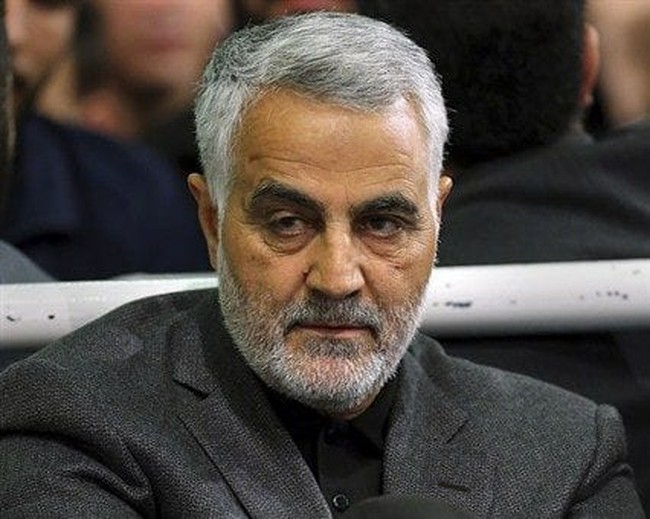
In this Friday, March 27, 2015 file photo released by an official website of the office of the Iranian supreme leader, commander of Iran’s Quds Force, Qassem Soleimani, sits in a religious ceremony at a mosque in the residence of Supreme Leader Ayatollah Ali Khamenei, in Tehran, Iran. The chief of an elite unit in Iran’s Revolutionary Guard has accused the U.S. of having “no will” to stop the Islamic State group after the fall of the Iraqi city of Ramadi, an Iranian newspaper reported Monday, May 25, 2015. (Office of the Iranian Supreme Leader via AP, File)
Last night, Iran launched a pair of missile strikes against military installments in Iraq, an opening salvo showing their anger at the United States for the death of Qassem Soleimani. It is almost certain that this is not the only retaliation we will see from Iran.
The Iranian military has some weaponry that can do damage locally, and it has some cyber warfare tactics it can pull off. But its ability to cripple the United States military locally (much less across the world) is nonexistent, and its imperialistic policies at home and with its neighbors have left the already unstable region in a state of disarray. Coupled with economic sanctions from the United States, Iran has very few options in terms of meaningful counterattack.
Iran, while powerful in the region largely due to its size, control of oil, and the instability of its neighbors, is very much a paper tiger on the global stage and has very little chance of winning any sort of major “conflict” with the United States. It knows this, which is why it is safe to assume the strikes last night were for propaganda purposes.
The Iranian government claimed (and outlets like MSNBC bought into it hook, line, and sinker) that they killed American troops. The U.S. government flatly denied that. The Iranians wanted to make a show of a victory, knowing full well that if they had actually killed American troops directly, they would be screwed.
Iran, under the direction of Soleimani, worked to get regional terror groups and rebel groups to spread chaos and discord throughout the region. They themselves never had the courage (or, perhaps, the ability) to do the dirty work themselves. Soleimani used these groups to destabilize Iran’s neighbors and exert Iran’s influence, at the cost of the neighboring populations’ trust and respect. Iran does not have any sort of moral high ground in this situation, and while you can make the argument that the U.S. provoked a response in its attack on Soleimani, you cannot argue that he did not have it coming. He crossed the line from foreign commander to terrorist organizer years ago, and he met a just end.
So the paper tiger that is Iran, under the leadership of crazed religious zealots, will continue to make big shows of strength without actually accomplishing anything. That does not mean our military is not in danger – indeed, we should be praying for the safety of our troops overseas – but it does mean that the United States government is directly involved in both ensuring their safety and also making sure they are in the right position to strike back if need be.
Regardless of the circumstances, if our military is at war, then we are at war. The American press seems to be very clearly on the side of America’s enemies. If it is to be war between us and Iran, however, then we are on our military’s side. A paper tiger can still be threatening, and it is not our job to undermine the soldiers whose jobs are to put their lives on the line for our freedoms.
Pray for our military, and may God have mercy on the souls of our enemies.













Join the conversation as a VIP Member